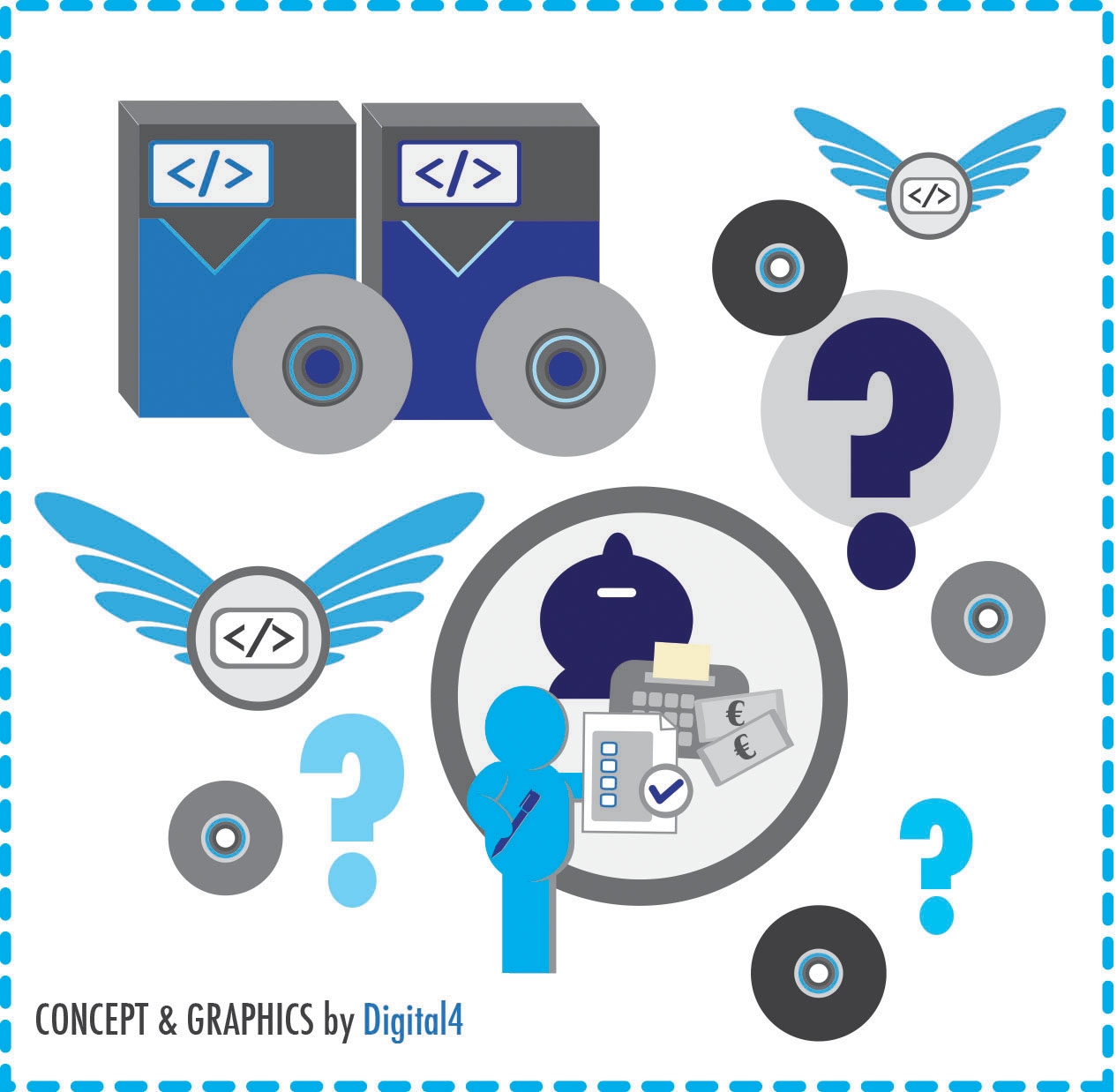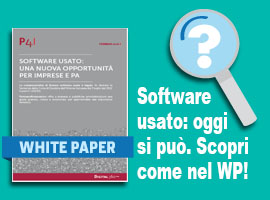
 The world of proprietary software live today a real transformation, like other major market trends, such as open source, the Software as a service, and the Cloud Computing . A renewal with respect to the supply potential is opening in Italy of the used software market: that’s how you can extract value from the assets of a company in the software, transferring them to the second-hand market.
The world of proprietary software live today a real transformation, like other major market trends, such as open source, the Software as a service, and the Cloud Computing . A renewal with respect to the supply potential is opening in Italy of the used software market: that’s how you can extract value from the assets of a company in the software, transferring them to the second-hand market.
According to a study published in January 2015 by Osterman Research, in fact, it is the 28% of organizations in know the shelfware : more than a phenomenon is a problem because it affects the software purchased and then unused in the company. The reasons may be different: it may be due to a change of computer system, extraordinary transactions (such as corporate restructuring or relocation of production activities), of insolvency proceedings or even just simple cessation of the business, rather than to simply need to purchase licenses, related to a license audit .
But things have changed now because companies can yield a product no longer in use and buy second-hand software, choosing the new economy of scale, extremely interesting. Know the existence of this possibility and the conditions under which the transfer operations can be safely constitutes an alternative in most of the possible business strategies on supply of computer resources and financial resources .
Software Used: what does the European legislation
 Back in July 2012, the European Court of Justice has spoken on the subject of software protection, declaring legitimate the sale of licenses already held by third parties with respect to the manufacturer (hence the term use ). Specifically, ruled that the author of a computer program can not oppose the resale of the licenses used , which already owned by third parties, establishing the principle that the exclusive right to the copy of a program distribution computer, covered by license indefinitely, not end with the first sale. Each successive buyer of the copy of a software , therefore, constitute a legitimate purchaser and can install the product that was sold, even if by a third party, edutilizzarlo within the limits of the original license terms or resell in turn. And the repercussions for companies that decide to enter the used software market are definitely positive:
Back in July 2012, the European Court of Justice has spoken on the subject of software protection, declaring legitimate the sale of licenses already held by third parties with respect to the manufacturer (hence the term use ). Specifically, ruled that the author of a computer program can not oppose the resale of the licenses used , which already owned by third parties, establishing the principle that the exclusive right to the copy of a program distribution computer, covered by license indefinitely, not end with the first sale. Each successive buyer of the copy of a software , therefore, constitute a legitimate purchaser and can install the product that was sold, even if by a third party, edutilizzarlo within the limits of the original license terms or resell in turn. And the repercussions for companies that decide to enter the used software market are definitely positive:
- free up financial resources through the sale of products no longer in use;
save on the purchase of licenses;
optimize cash flows, allowing the exchange mechanism to regulate part of the licenses purchased with the sale of products no longer in use;
access, at the same cost, to more high-end software products compared to those within the reach of the customer’s spending power.
second hand software here is the background
To change the regulations regarding the sale and purchase of the software have been several concomitant factors, starting from the progressive penetration of digital technologies.

 Gabriele Fagg, jurist, Partners4Innovation and President Clusit ” the digitization of intellectual works and the creation of supports for their enjoyment with their own memory – explains Gabriele Fagg, lawyer and partner of P4I – have meant that the works protected by copyright may also be sold regardless of their incorporation of tangible physical media, making thus the emergence of a series of problems relating to the transition from traditional negotiation patterns to new forms of marketing through the Internet . The issue has come to the center of the debate among the experts, following the spread, mainly on the German and Swiss markets, business models relating to the marketing of software licenses second hand software ; practice that was finally legitimized, albeit with some doubts as to interpretation, the effect of the ruling C-128/11 issued by the European Court of Justice July 3, 2012 which, on the occasion of a specific case, ruled in favor the legitimacy of the sale of used copies of computer programs. The Court completed the sale as the agreement by which a person gives to others indefinitely, against the payment of a price, its ownership of a material or intangible property belonging to he. From that definition that the negotiating process which, pursuant to art. 4, paragraph 2, Directive 2009/24, leads to exhaustion of that dividend right to a copy of the computer program, will necessarily involve a transfer of the property right on it. “
Gabriele Fagg, jurist, Partners4Innovation and President Clusit ” the digitization of intellectual works and the creation of supports for their enjoyment with their own memory – explains Gabriele Fagg, lawyer and partner of P4I – have meant that the works protected by copyright may also be sold regardless of their incorporation of tangible physical media, making thus the emergence of a series of problems relating to the transition from traditional negotiation patterns to new forms of marketing through the Internet . The issue has come to the center of the debate among the experts, following the spread, mainly on the German and Swiss markets, business models relating to the marketing of software licenses second hand software ; practice that was finally legitimized, albeit with some doubts as to interpretation, the effect of the ruling C-128/11 issued by the European Court of Justice July 3, 2012 which, on the occasion of a specific case, ruled in favor the legitimacy of the sale of used copies of computer programs. The Court completed the sale as the agreement by which a person gives to others indefinitely, against the payment of a price, its ownership of a material or intangible property belonging to he. From that definition that the negotiating process which, pursuant to art. 4, paragraph 2, Directive 2009/24, leads to exhaustion of that dividend right to a copy of the computer program, will necessarily involve a transfer of the property right on it. “
In summary, the judgment of the Court of the European Union adopted a particularly wide of the sale , enshrining the principle that can not be attributed relevance to the legal classification assigned to the contract by the parties, nor to by agreement the terms of contract, rather than having to have regard to the specific effects produced by the operation of negotiations .
To explore the theme please visit the white paper written by P4I – Partners4Innovation , the Digital360 Group company that provides advisory services and coaching to support the Digital Transformation and Innovation and Entrepreneurial open to businesses and public administrations.
No comments:
Post a Comment